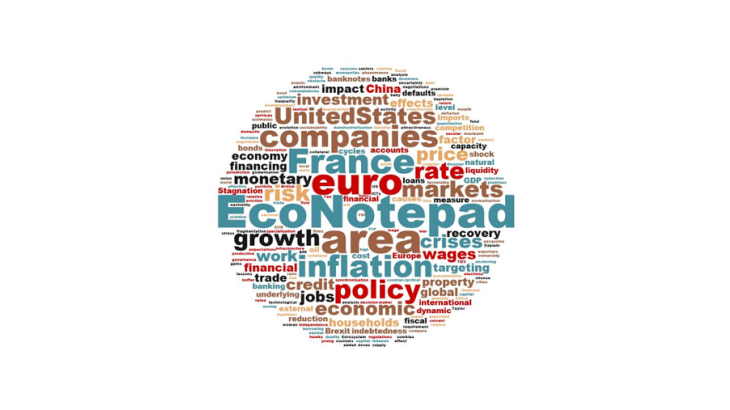Blog posts reflect our core business…
Many posts focused on inflation, which is a key topic for a central bank. For instance, in spring 2017, we considered whether there would be a lasting recovery in euro area inflation. The answer was positive but this forecast was based on a combination of factors with sometimes ambiguous effects: for example, price dynamics can be buoyed by the growth in negotiated wages in France or the rise in oil prices; but they can also by dampened by wage moderation linked to the higher labour supply of baby boomers, the increase in the employment of seniors or the impact of Chinese competition on average wages. Indeed, through competition from low-wage countries and low-cost imports of intermediate or final goods, globalisation exerts downward pressure on inflation. While euro area inflation is expected to rise in the medium term, some countries such as Japan nevertheless remain characterised by low inflation and contained wage growth. Sluggish wage and GDP growth raises questions as to the risk of secular stagnation and to the natural interest rate of the economy.
Against this backdrop, monetary policy had to meet numerous challenges and, since the financial crisis, central banks have undertaken unprecedented actions to ensure that inflation rates moved back to close to the 2% target: Two such measures were the expansion of the range of eligible collateral and Targeted Longer-Term Refinancing Operations (TLTRO).
Since the 2008 crisis, many central banks were also given an explicit financial stability mandate, as was the case for the Banque de France in 2013. To this end, focus is being placed on anticipating financial crises, measuring financial cycles or designing tomorrow’s prudential tools in order to reduce the risks of crises. Another key area for consideration is the interaction between the economy and finance, in particular for households regarding developments in their financial savings or real estate sector dynamics.
… and consider questions related to competitiveness and growth…
The structural competitiveness of supply, in particular that of France, is another of our key concerns: for instance, discussions have centred on the country’s sectoral specialisation and the level of productivity of firms, the importance of reducing reducing payment periods, the concentration of markets or even the factors of attractiveness related to infrastructures such as the TGV or the metro. This competitiveness cannot be dissociated from the topics of investment or the improvement in French firms’ net borrowing capacity, and in the cost of equity and corporate profitability, which has helped to promote productive investment since 2016, or from the generally positive impact of corporate bankruptcies on economic growth.
…as well as more international and social issues
More recently, Eco Notepad also discussed subjects such as the implementation of protectionist measures by the US administration coupled with an expansionary fiscal policy. Other topics discussed included: how to quantify the losses from a global trade war? What impact would be expected of a procyclical fiscal and tax policy in the United States? What role does external wealth play against the background of a worsening US current account deficit and an attendant increase in the external financing requirement? To what extent can the international environment influence US monetary policy?
Lastly, Eco Notepad also considered the representation of women in central bank governance and more generally in academia, decision-making bodies or in research or economic institutions.
In its forthcoming posts, Eco Notepad will continue to enrich discussions using economic, financial and monetary analyses, while ensuring the rigorousness of the studies published. Eco Notepad is part of the Banque de France’s broad initiatives aiming to contribute to bolstering the understanding of economic events and mechanisms.
The editorial team of Eco Notepad wish our readers a Happy New Year and hope to see even more of you on the Bank’s website.
